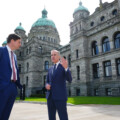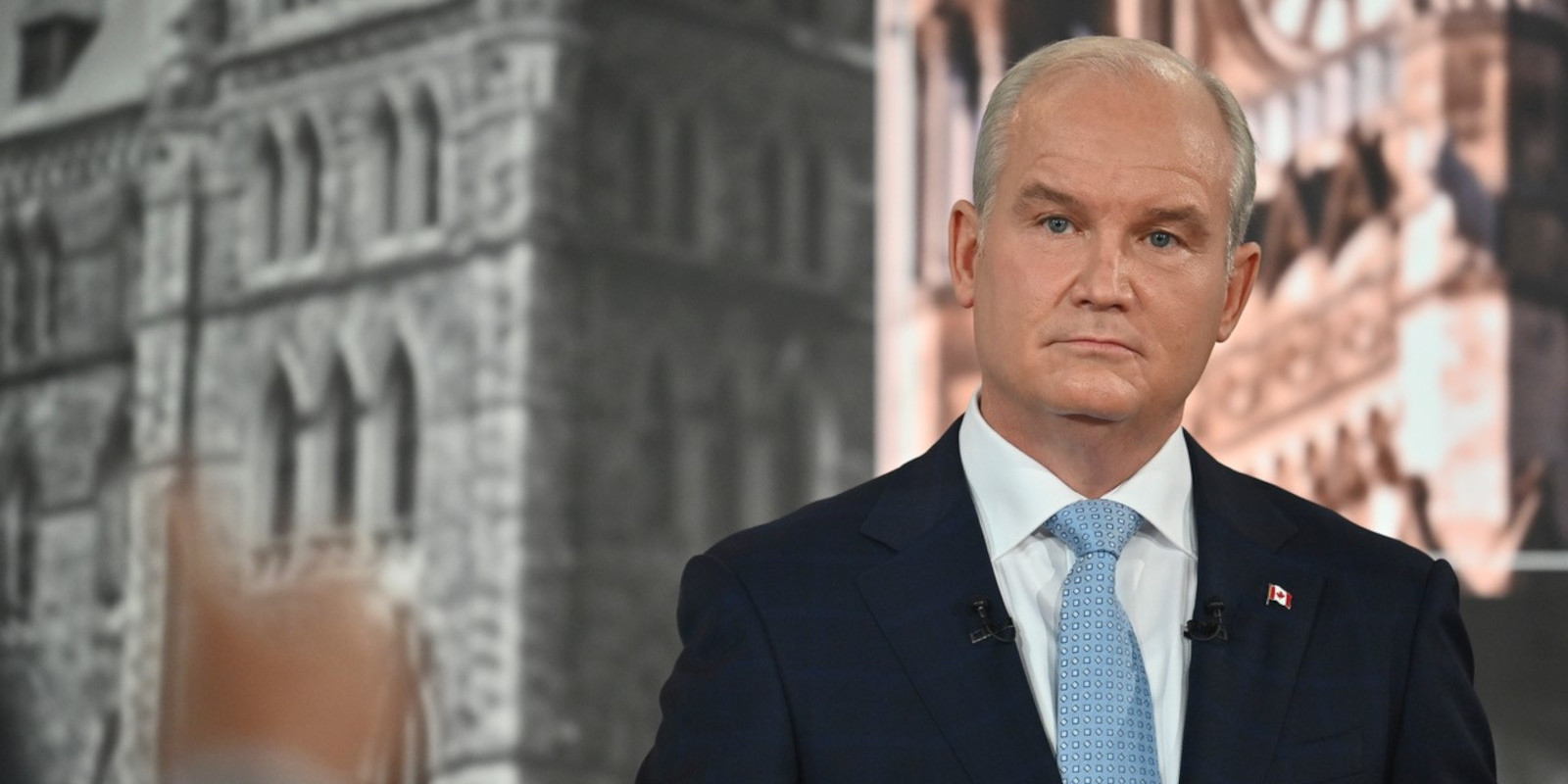Welcome to The Hub’s Federal Election 2021 Policy Pulse, where we’ll be tracking all the policy announcements from the major parties, with instant analysis from our crew of experts.
With the election scheduled for Sept. 20, we’ll be monitoring 36 days worth of policy ideas, so watch out each morning for the day’s live blog where we’ll be tracking every announcement as it happens.
4:30 p.m. — Better Debate Questions: A policy-focused lightning round from The Hub’s contributors
This afternoon we’re running a series of debate questions that we wish the moderators would ask the party leaders at tonight’s English-language debate. Whether it’s to shine a light on an under-explored issue or dig a little deeper on something the leaders have only discussed superficially, we hope to expand our national debate just a little bit.
And, if you happen to be one of the many moderators at the debate tonight, please feel free to steal our work.
By Howard Anglin
Name a Supreme Court of Canada decision you disagree with. The courts are human institutions that, in Canada, are empowered to review and strike down laws, often based on judges’ ideological, moral or political intuitions on issues where there is strong disagreement among Canadians and even among members of the SCC. Which decision(s) do you think they’ve got wrong, and what would you do about it?
By Vass Bednar
If elected, will you commit to a comprehensive review of the Competition Act?
By Matt Spoke
If elected, how would you address the so-called brain drain of so many of our STEM graduates moving to the U.S. for opportunities?
By Livio Di Matteo
Canada’s trade policy is closely linked to the United States which takes 75 percent of our exports . Yet, the United States has become more protectionist and this has been aggravated by COVID-19 and border complications. Meanwhile, what was once seen as an alternative for future growth – China – has become problematic due to our relations with their government. So, given that we are increasingly finding our trade relationships fraught with difficulty with respect to the two largest economies in the world, what is our path forward when it comes to growing our trade?
By J.D.M. Stewart
The history of Canada and how we commemorate it has been front and centre for many months now. Much of the discussion has been contentious and a number of acts of vandalism have occurred. Where do you stand on the tearing down of statues, the re-naming of streets and the general discussion about history in this country today?
By Patrick Luciani
At the beginning of the COVID-19 outbreak, Canada and China undertook a joint venture to find a vaccine. The agreement fell apart when China effectively scuttled the project. Why did Canada chose to partner with China in the first place, and why don’t we know more of the circumstances of that failure?
By Ken Boessenkool
If you had to go for a coffee with one of the other leaders on stage, who would it be and why?
4:00 p.m. — Better Debate Questions: Think Tank Edition
This afternoon we’re running a series of debate questions that we wish the moderators would ask the party leaders at tonight’s English-language debate. Whether it’s to shine a light on an under-explored issue or dig a little deeper on something the leaders have only discussed superficially, we hope to expand our national debate just a little bit.
And, if you happen to be one of the many moderators at the debate tonight, please feel free to steal our work.
For this update, we asked our friends at Canadian public policy think tanks what was on their minds.
By Katie Davey, the editor of Public Policy Forum Media
- Technology is changing the nature of work — this was only amplified and accelerated during the pandemic. Is this a good thing or bad thing and what policies does your party think are needed to address such a change?
- Climate change remains a top issue for Canadians. In a net zero emissions world, is Canada trying to decarbonize its fossil fuels industry to maintain its jobs, revenues and exports or is it looking to hasten its phaseout? How do we get to your party’s preferred outcome?
- The pandemic has demonstrated clearly how harmful dis- and misinformation is to the foundation of our democracy and a healthy society. At the same time, local journalism continues to be at risk across the country. How would your party address the growing information gap in Canada?
By Ken Coates, a Munk Senior Fellow at the Macdonald-Laurier Institute and the director of MLI’s Indigenous Policy Program
- Many Indigenous communities and a solid majority of Indigenous people favour carefully managed resource development that provides appropriate returns to Indigenous communities. But they feel that current government policy is anti-development and does not give sufficient weight to their concerns and aspirations. If you formed government, how would you ensure proper Indigenous engagement in resource development?
- Indigenous peoples have made it clear that autonomy is much preferred over dependency on government and continued paternalism. How would your government support Indigenous self-government and greater respect for Indigenous rights?
By Jonathan Berkshire Miller, the senior fellow with the Japan Institute of International Affairs (JIIA) and director and senior fellow of the Indo-Pacific Program at MLI
- Michael Kovrig and Michael Spavor have been hostages of China for over 1000 days. What strategy would you employ to get them home?
- In addition to the detention of Canadians, China is presenting a sustained, complex and evolving challenge to Canadian interests and that of our friends and allies around the world. How would you as leader meet this challenge?
- We know that the Taliban’s overthrow of the elected government of Afghanistan was only possible due to the dedicated support of Pakistan. Do you believe Pakistan should be sanctioned for its role in supporting this terrorist organization’s coup against the Afghan government and people?
- Defence procurement in Canada has been a mess for many years. One major issue is politicization, which sets back the process and undermines the ability of National Defence to actually get the equipment that our men and women in uniform need. Can you commit that a government led by you would de-politicize military procurement, and how would you ensure that this is done?
By Aaron Wudrick, the director of the Macdonald-Laurier Institute’s domestic policy program
- As prime minister, how will you strike the right balance between protecting the principle of free speech and expression while addressing concerns about threats posed by the spread of hate and misinformation?
- Politicians often talk about how to redistribute wealth, but far too little attention is paid to how to grow wealth for all Canadians. What is your plan to increase GDP?
- The COVID-19 pandemic has demonstrated many weaknesses in Canada’s healthcare system, most especially a stunning lack of capacity compared to OECD countries. How would you fix the structural issues with our healthcare system?
- Canada has the lowest ratio of houses per capita in the G7, and every year this relationship is worsening. This is precipitating our housing crisis. How would you work with the provinces and municipalities to get supply built quickly?
By Krystle Wittevrongel, public policy analyst at the MEI
- With debt servicing costs, also known as public debt charges, projected to reach $22.1 billion in 2021-2022 (gobbling up 6 percent of total federal revenue), a concrete plan is needed. As we continue spending record amounts in order to merely pay the interest on the federal credit card, it will become increasingly difficulty to meet the legitimate needs of Canadians in the future. What is your plan for debt repayment?
- We have also recently seen inflation rates at their highest levels in over a decade. Given the role played by public spending in our rising cost of living, the government must accept responsibility for the consequences of its actions. Once and for all, the federal parties need to commit to seriously reviewing program spending growth and measures that are fuelling inflation. How do you plan to control inflation?
- We have made tremendous strides in reducing emissions and improving Canada’s environmental record, and we have also invested billions of dollars into research and development for the creation of greener technologies. Alongside the consideration of climate change policies, how do you plan to manage the approval process for major Canadian energy projects?
By Daniel Proussalidis, the director of communications at Cardus
- Why do all the major party leaders view childcare as an economic issue, instead of thinking about it the way parents do – as a means of caring for their children? Childcare is the care of a child, no matter who does it, which is why Canadian families depend on a diverse array of childcare options, including the 40 percent of kids under age six in parental care only. So, how would you respect and enhance the options that are available to families instead of funding one form of care, which drowns out all the others?
- Parliament missed the opportunity last year to help revive charitable giving in Canada through a donation-matching incentive in the midst of the pandemic. Given that the pandemic is still far from over and we need the charitable sector more than ever, how would you revive Canadian’s charitable giving and help strengthen charities, especially small and community-focused ones, for our post-pandemic future?
- Few of you have broached the issue of freedom of conscience, but there is a great need for clarity on the issue as Canadian law changes around MAiD and other issues. When a person betrays her conscience, she violates her integrity, identity, and human dignity. So, what steps will you take to ensure that governments and regulatory bodies don’t prevent individual Canadians from living in alignment with their moral convictions?
- And the supreme institution where Canada’s debates should take place is Parliament, but it was largely sidelined during the early part of the COVID pandemic. It took weeks to recall Parliament for online meetings while formal budgets and regular debates were suspended for whole seasons. How well has the institution of Parliament survived COVID and how would you preserve democratic and parliamentary procedures in any future crisis?”
3:30 p.m. — Better Debate Questions: Four questions about life after the COVID-19 pandemic
This afternoon we’re running a series of debate questions that we wish the moderators would ask the party leaders at tonight’s English-language debate. Whether it’s to shine a light on an under-explored issue or dig a little deeper on something the leaders have only discussed superficially, we hope to expand our national debate just a little bit.
And, if you happen to be one of the many moderators at the debate tonight, please feel free to steal our work.
By Samuel Duncan, contributor at The Hub
Question: Given the importance economically, socially and culturally of the special relationship Canada and the United States share, how would you as prime minister work to ensure the safe re-opening of Canadians ability to cross the land border into Canada?
Why it matters: The inability of Canadians to be able to cross into the United States and the lack of a coherent plan or path to re-open threatens to fundamentally alter the state of the relationship between Canada and the United States. Not everyone is able to afford to travel by air, which is making crossing into the United States a luxury good, further shining a light on the growing inequality within Canada.
Question: The pandemic has necessitated the restriction on many of our rights and freedoms, however, as time continues it appears as though we may be ushering a more permanent shift in the role public health plays in determining the ways we interact within our society. What are the metrics you would use, objectives that need to be reached, and measures and steps that you would take as prime minister to ensure that there is a transparent process to understand what the role public health will play in Canadians’ lives post-pandemic? Will it be politicians or public health officials that will be in charge of our social and economic lives?
Why it matters: Crisis and black swan events often signal a shift in the role that the state plays in our lives and given that this is seemingly an endemic virus, politicians should explain how important public health officials will be in determining what our society looks like post-pandemic.
Question: What role do you believe Canada should play in determining the origins of COVID-19?
Why it matters: COVID-19 ‘s origin should be a top concern for western nations as we have the capacity and resources to determine how COVID-19 originated to help ensure it never happens again.
Question: How would you as prime minister improve the way the bureaucracy responds to crisis like COVID-19 and manages the new challenges of the 21st century which a hierarchical top-down government bureaucracy may not be best suited to deal with?
Why it matters: While Canada ought to be mostly proud of the way we have handled the pandemic, our record on swiftly securing our border, implementing mass testing, slow regulatory approvals for innovative approaches in fighting the virus or conducting an effective contact tracing regime is one of a risk adverse and slow to act government bureaucracy. Many of us have lost trust in the ability of our public institutions and we need to reinvigorate them if we are to help Canada succeed in an increasingly atomized and polarized world.
2:30 p.m. — Better Debate Questions: Three tough questions on Indigenous issues
This afternoon we’re running a series of debate questions that we wish the moderators would ask the party leaders at tonight’s English-language debate. Whether it’s to shine a light on an under-explored issue or dig a little deeper on something the leaders have only discussed superficially, we hope to expand our national debate just a little bit.
And, if you happen to be one of the many moderators at the debate tonight, please feel free to steal our work.
By Karen Restoule, contributor at The Hub
Question 1: In 2015, Prime Minister Justin Trudeau promised to deliver clean drinking water to all Indigenous communities within 5 years. Today, the federal government website lists 50 long-term drinking water advisories and 47 short-term advisories. How do the parties intend to address this international embarrassment and advance reconciliation with Indigenous peoples?
Question 2: This past summer, Canadians watched in horror the rediscovery of remains of thousands of Indigenous children who had been forcibly removed from their families and placed in one of the 140 Indian residential schools. Currently, across the country, Indigenous communities are undertaking the work to identify bodies and return remains of the children back to their homes. Despite this, leaders have been oddly quiet throughout the campaign on this point and on Indigenous policy generally. How do the parties intend to advance reconciliation with Indigenous peoples while honouring the darker shades of our shared history?
Question 3: The RCMP have spent $20 million policing Wet’suwet’en territory for what is clearly a question of Indigenous rights and title that would best be resolved by a federal negotiation table. This is one example of many that involve unresolved issues related to the Indigenous-Crown relationship, which are ultimately preventing Canada from achieving its true potential. How do the parties intend to advance reconciliation with Indigenous communities on these issues of governance?
1:45 p.m. — Better Debate Questions: Does Canada need stricter border controls with the U.S.?
This afternoon we’re running a series of debate questions that we wish the moderators would ask the party leaders at tonight’s English-language debate. Whether it’s to shine a light on an under-explored issue or dig a little deeper on something the leaders have only discussed superficially, we hope to expand our national debate just a little bit.
And, if you happen to be one of the many moderators at the debate tonight, please feel free to steal our work.
By Blair Gibbs, contributor at The Hub
Question: With political extremism, social unrest, crime rates, gun violence, and uncontrolled mass migration all rising significantly in the United States, is it time for Canada to safeguard our way of life by investing in stricter border controls so we regulate more tightly the flow of people and goods with our southern neighbour in the future?
Why it’s important: Gun control has erupted as a campaign issue, however gang violence in Quebec and B.C. is enabled by illicit flows of handguns from organized crime groups operating across the U.S. border. Mass gun ownership in the U.S. is here to stay, and now violent crime rates are rebounding after decades of general decline, so illicit drugs, human traffickers, and smuggled weapons may pose a greater threat in the next decade. In addition, the mass migration at the Mexico border will eventually create additional refugee pressure for Canada, and the U.S. resources devoted to the northern border are one-tenth of what they devote to stopping illegal entry in the south. If Canada wants to continue to welcome migrants from across the world, it cannot afford to lose control of immigration. It should invest more in law enforcement and its own land border services so that those coming here arrive in a regulated way, via established visa channels.
12:30 p.m. — Better Debate Questions: How would you ensure Canadian government finances are sustainable?
This afternoon we’re running a series of debate questions that we wish the moderators would ask the party leaders at tonight’s English-language debate. Whether it’s to shine a light on an under-explored issue or dig a little deeper on something the leaders have only discussed superficially, we hope to expand our national debate just a little bit.
And, if you happen to be one of the many moderators at the debate tonight, please feel free to steal our work.
By Trevor Tombe, contributor at The Hub
Question: Canadian governments have rightly borrowed significant sums to support individuals and businesses during the pandemic. But looking forward, an aging population, potentially slower economic growth, and difficult economic transitions may put even larger pressure on government finances across Canada. How would you as prime minister work with provincial and territorial governments to ensure Canadian government finances, and not just federal finances, are sustainable in the face of these challenges?
Why it’s important: The issue of population aging has been important for many years, but pressure is mounting and few governments are prepared. The potential for rising healthcare costs and slowing rates of economic growth as more and more people exit the labour force will grow larger through the balance of the decade and well into the next. Current projections suggest that provincial and territorial governments in particular face a credible prospect of debt levels rising by more than we’ve seen during COVID. These pressures are slow moving, however, so rarely rise to the attention of politicians during a campaign or even to the agenda of a government operating on a four year (or less) cycle. Debates are the right time to press leaders on important issues whether they want to focus on them during a campaign or not.
11:15 a.m. — Over-promising and under-delivering with respect to China has been a multi-partisan endeavour
By Charles Burton, a senior fellow at the Macdonald-Laurier Institute
One of the most important issues facing Canada is one which our political leaders have hardly spoken about: what to do about China’s increasing aggression and revisionism on the world stage.
The Liberal and NDP platforms provide next to no detail on how they would change Canada’s approach to the China challenge, so it is hard to assess whether either party would pursue the kind of serious China strategy that has been lacking for many years.
With sparse platforms of their own regarding China, some of our political leaders may be looking for ideas. Here are some that they could consider adopting:
- In concert with allies, employ Magnitsky Sanctions against officials responsible for the tortuous detentions of Michael Kovrig and Michael Spavor, as well as any officials responsible for acts of genocide against Uyghurs in Xinjiang.
- Streamline a refugee process for Hong Kongers who are at risk of political imprisonment.
- Implement new legislation to tackle foreign influence and interference, including when it comes to strategic infrastructure investment and Chinese state-owned enterprises.
- Convene a whole-of-government approach to combat disinformation emanating from China.
- Strengthen regional cooperation with organizations such as ASEAN or the Quad to help focus and coordinate engagement in the Indo-Pacific.
- Ban Huawei from participation in Canada’s 5G network.
- Develop closer economic, political, security, and people-to-people ties with Taiwan.
- Withdraw from the China-led Asia Infrastructure Investment Bank.
- Diversify trade away from China, prioritizing likeminded countries as trade partners.
- Boycott the upcoming Winter Olympics in Beijing.
Many of these ideas, or variations on these ideas, are included in the Conservative platform, which is in many ways refreshing to see. The Tory platform is detailed and serious with respect to China.
However, without substantial focus on China over the course of the election, it is unclear whether this is a top priority for the Conservatives. Overpromising and underdelivering with respect to China has long been a multi-partisan issue; it remains to be seen if the Conservatives are committed to following through on their plan.
10:00 a.m. — Leave the debate planning to the parties. Last night’s dreary spectacle made our politics dumber
By Ken Boessenkool, contributor at The Hub
I didn’t watch the French language debate. But neither, I suspect, did you. Or if you started, you almost certainly didn’t finish.
I decided to follow the debate on Twitter. But even there, journalists who promised to live tweet the event, could hardly be bothered. And they were presumably getting paid to watch! Even very smart and well-followed pundits with a close relationship to the current prime minister were distracted from the debate long enough to fire sarcastic zingers at a nobody. As an aside, sarcastic @gmbutts is my favourite @gmbutts.
This was all drearily predictable. This debate was planned and prepared by an official government agency appointed by, well, I can’t even be bothered to check. Someone in the government I suppose. It includes a couple of political has-beens, but is mostly just a bunch of the Canadian Smart Set. (I actually don’t mean that as an insult. Being smart and being part of the Canadian set are both things I aspire to.) It is led by the former stellar Governor General of Canada, David Johnston, who one thinks has enough smarts and credibility to resign in protest at the poor job that’s been done here.
Planning debates is something political parties should do. In the good old days (2019 and prior), each party designated a senior representative to negotiate with other senior party representatives on debate format, timing and look. Taking this away from political parties and giving it to some independent commission makes, at worst, our politicians dumber and our politics stupider. At best, it makes both more boring.
Honestly, if this debate doesn’t make you more libertarian, I don’t know what will. Because if we design and run government programs the way we designed and ran this debate… which of course we do.
I didn’t finish watching the debate. I wrote this instead. Anyway, I’m sure I’ll find out soon enough if any leader said anything memorable. In the meantime, I’m making alternative plans for the evening of the English language debate.
8:30 a.m. — This election is a battle between a British-style campaign and an American-style campaign
by Brent H. Cameron, contributor to The Hub
One of the most interesting aspects of this election campaign is the disconnect between the two leading parties. Not the disconnect between the Liberals and Conservatives on policy. That is a given. The disconnect is much more basic.
For at least three decades elections have been fought on issues — and with strategies — inspired by the politics of our southern neighbour. Abortion, gun control and the like are staples of the American narrative, and while no major party in Canada is advocating policies on these issues that would seem dissimilar to American ears, it has been the practice to conflate the nuances into ideological chasms. Indeed, even the position of the Canadian equivalent of the NRA would not be acceptable to the actual NRA.
But these issues still have resonance. Even if they do not resemble the reality on the ground and on our streets, they dominate our popular culture — television, movies, and 24-hour news channels to name a few. It should not surprise anyone that many Canadians were just as emotionally engaged and vocal over last year’s presidential election as they are about this federal vote.
For the last few election cycles, the major parties have campaigned as though Canada has been a political adjunct of the United States. Liberals and Conservatives have not only adopted strategies and technologies from their counterparts, but the contest between the two since the 1980s has felt a little like a contest between watered-down versions of the Democrats and Republicans.
But as much as our popular culture is heavily Americanized, our history and institutions are not.
The fact that we are a constitutional monarchy, with a prime minister, a Westminster-style Parliament, and a more decentralized, officially bilingual and multicultural federation means that the way we govern our affairs is decidedly different.
They are more British than American. And that is why this election is very different.
The Liberal campaign has focused its attention by hitting on sensitive social issues such as abortion, gun control, and health care. The tone and tenor are virtually indistinguishable from the content one might see from a self-styled Liberal Democrat running for a congressional seat in New York City or a suburb of Baltimore or Los Angeles.
The Conservative campaign, in contrast, has real similarities to the “Blue Collar Conservative” approach taken by Boris Johnson — the approach that completed Brexit, broke the Labour Party’s hold on key constituencies in northern England — the so-called “Red Wall” and still maintains a healthy lead in the polls nearly two years on.
We might have American dreams and fantasies, but we lead somewhat British lives, making us quintessentially Canadian.
Given this dichotomy, should we be surprised that the British style campaign and the American style campaign are currently in a statistical tie for the lead?
7:00 a.m. — Where the leaders are today
All the leaders will be participating in the English debate tonight.
Recommended for You
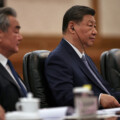
‘The playgrounds are empty’: Could China’s demographic crisis threaten its superpower ambitions?

‘In one generation, the population will be halved’: Why China may not be the world superpower we think it is
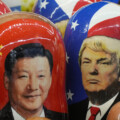
Trump axing free trade deals is contributing to China’s rise: Report
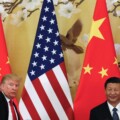
‘Multipolarity is upon us’: Report shows American protectionism will cause global turmoil and China’s rise
